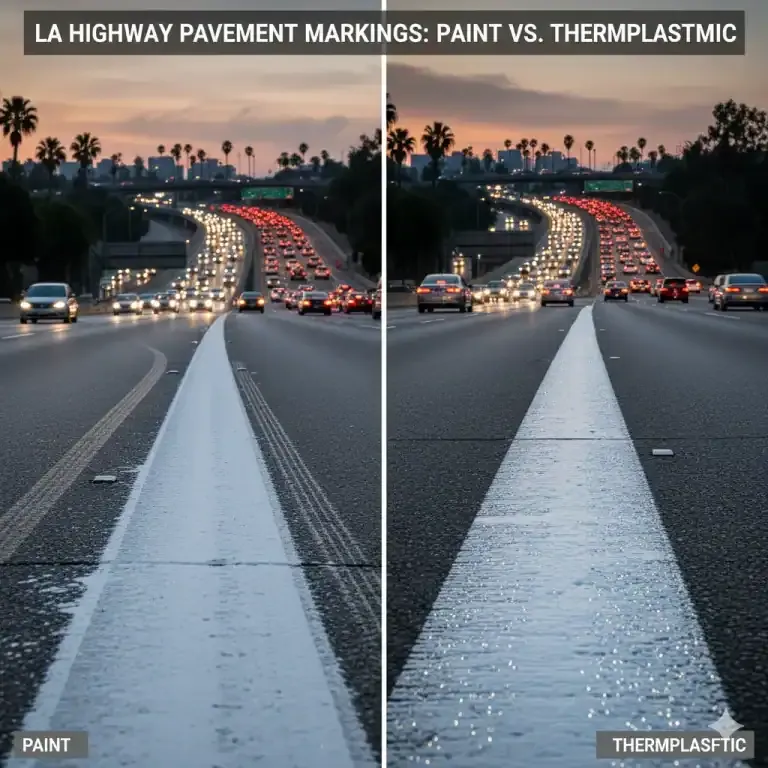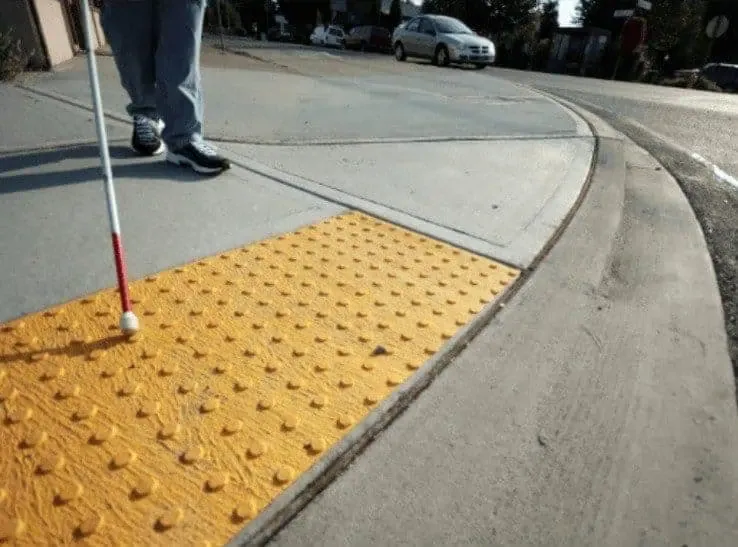Parking accessibility is a cornerstone of business operations in Los Angeles, particularly for compliance with the Americans with Disabilities Act (ADA). Ensuring your parking lot is accessible to individuals with disabilities is not only a legal mandate but also a chance to foster an inclusive environment that welcomes all customers. Non-compliance with ADA parking standards can lead to substantial fines, lawsuits, and reputational damage, making it critical for business owners to understand and implement the specific federal and California-specific regulations.
This comprehensive guide will help you understand California ADA regulations and ensure your business meets accessibility requirements.
- Navigate key ADA parking regulations for Los Angeles businesses.
- Understand the differences between federal ADA regulations and California-specific requirements.
- Design and maintain ADA-compliant parking lots that meet accessibility requirements for people with disabilities.
- Meet the stricter standards required for hospitals and healthcare facilities.
- Implement best practices for ongoing compliance through regular inspections and maintenance.

This guide provides a detailed overview of ADA parking requirements, including parking space dimensions, signage, maintenance, and answers to common questions, ensuring your business remains compliant and accessible.
The Basics of ADA Parking Regulations
The ADA, enacted in 1990, mandates that public parking lots provide accessible spaces for individuals with disabilities. These spaces must be appropriately sized, clearly marked, and strategically located to ensure safe and convenient access for people with disabilities. Compliance with ADA regulations is mandatory for all businesses, regardless of size, to guarantee equal access to services and products for people with disabilities.
Key ADA Guidelines for Parking Spaces
- Accessible Parking Spaces: The number of required accessible spaces is determined by the total number of parking spaces in the lot, ensuring proportional accommodation for individuals with disabilities.
- Van-Accessible Spaces for people with disabilities: At least one accessible space per lot must be van-accessible, featuring wider dimensions to accommodate vehicles with lifts or ramps.
- Access Aisles: These must be adjacent to accessible spaces, providing unobstructed space for mobility device users to enter and exit their vehicles.
- Signage: Accessible spaces must display the International Symbol of Accessibility, visible to drivers and Los Angeles business owners, and placed at a height that remains clear over parked vehicles.
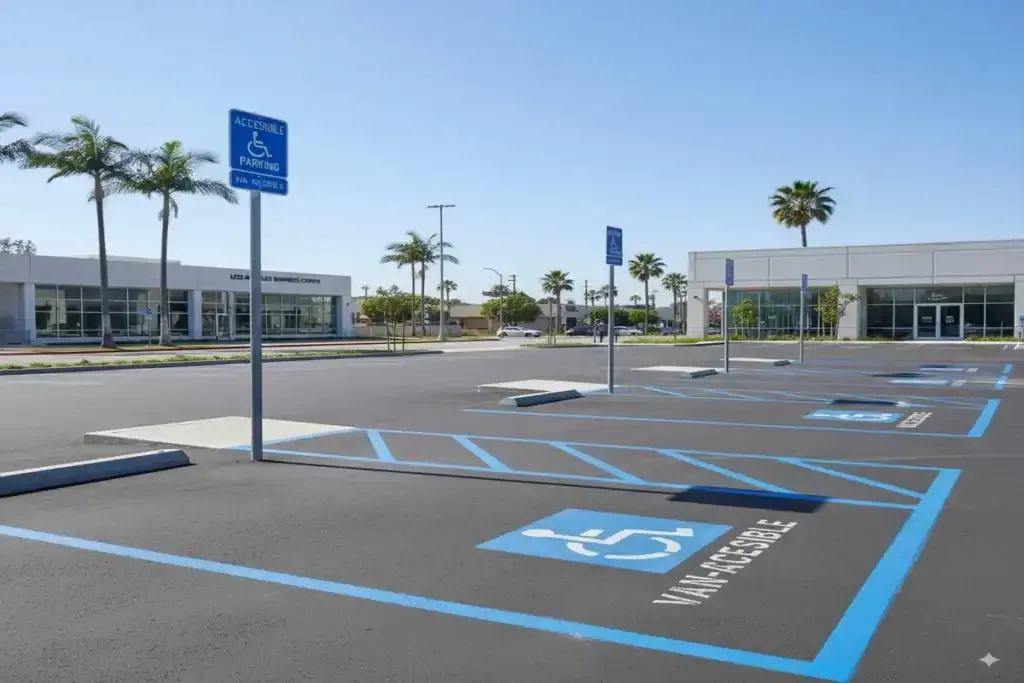
California-Specific ADA Parking Requirements
California’s Building Code (CBC), under Title 24, imposes stricter accessibility standards than federal ADA guidelines, reflecting the state’s commitment to enhancing access for individuals with disabilities. These additional requirements apply to all businesses operating in California and focus on parking lot design, signage, and enforcement to ensure accessibility requirements are met.
California’s Key Regulations
- More Accessible Spaces for people with disabilities are essential for promoting inclusivity and compliance with ADA regulations.California mandates a specific number of accessible parking spaces, requiring two accessible spaces for every 25 total parking spaces, compared to the federal requirement of one per 25. This ensures greater accessibility in larger parking lots.
- Van-Accessible Spaces: One in every six accessible spaces must be van-accessible, accommodating vehicles with wheelchair lifts or ramps, which is critical for users with mobility devices and compliance with ADA regulations.
- Penalties for Non-Compliance: Violations in California can result in fines starting at $4,000 per infraction, with potential lawsuits from individuals unable to access your business due to non-compliant parking facilities.
These stricter standards underscore California’s commitment to accessibility, requiring businesses to exceed federal minimums to ensure compliance.
Key Design and Striping Requirements for ADA Parking Lots
ADA compliance extends beyond providing accessible spaces—it requires precise design and clear markings to ensure functionality and safety for people with disabilities, adhering to California ADA standards. A poorly designed parking lot, even with accessible spaces, can lead to non-compliance and accessibility barriers.
Dimensions of ADA-Compliant Parking Spaces
- Standard Accessible Spaces for people with disabilities: Must be at least 96 inches wide with a 60-inch access aisle, allowing individuals using wheelchairs or other mobility aids to maneuver comfortably.
- Van-Accessible Spaces: Require 132 inches in width with a 96-inch access aisle and 98 inches of vertical clearance to accommodate vehicles with lifts or ramps.
- Access Aisles: Must be 60 inches wide for car-accessible spaces and 96 inches for van-accessible spaces, ensuring sufficient space for navigation between vehicles.
Striping and Marking Requirements
- Accessible spaces must be marked with the International Symbol of Accessibility (36 inches by 36 inches) on both pavement and signage for clear identification.
- Access aisles must feature diagonal lines (often blue or yellow) to prevent unauthorized parking, keeping the area clear for mobility device users.
- No Parking Signs : Signage must be placed on access aisles to ensure they remain unobstructed, with signage at least 60 inches above the ground for visibility in accordance with ADA requirements.
Proper design, striping, and signage are critical to creating a safe and compliant parking environment for customers with disabilities.
Maintenance and Regular Inspections for ADA Compliance
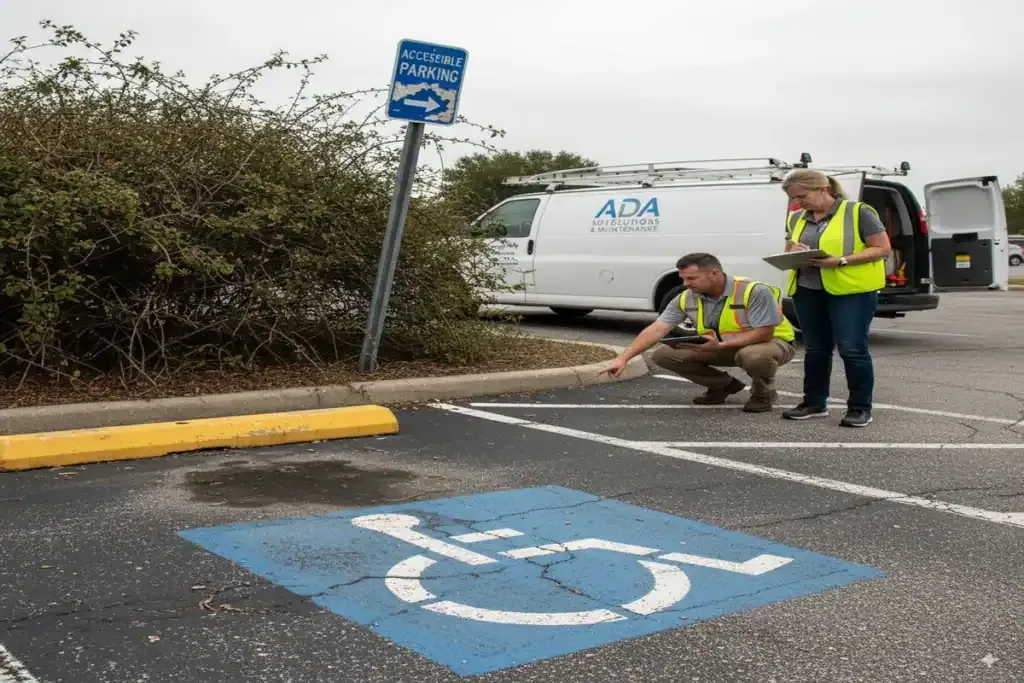
Maintaining ADA compliance is an ongoing responsibility. Over time, environmental factors and wear can cause striping to fade, signs to deteriorate, or access aisles to become obstructed, leading to potential violations of ADA regulations and legal risks.
Routine ADA Inspections
- Engage a Certified Access Specialist (CASp) to conduct regular compliance audits. These professionals can identify issues, recommend solutions, and provide a CASp report, which may offer legal protections in case of lawsuits related to ADA regulations.
Re-striping and Sealcoating
- Re-striping : Regular re-striping ensures that accessible spaces and access aisles remain clearly marked and visible, maintaining compliance with ADA and California Building Code (CBC) standards for the number of accessible parking spaces.
- Sealcoating: Applying sealcoat protects pavement from cracks and deterioration, ensuring smooth, safe surfaces for all users, including those with mobility challenges and accessibility requirements.
Proactive maintenance and inspections are essential to avoid violations and ensure year-round accessibility.
Hospital-Specific ADA Parking Regulations in Los Angeles
Outpatient Facilities
- Minimum Accessible Spaces: At least 10% of parking spaces must be accessible to accommodate patients and visitors with mobility challenges.
- Van-Accessible Spaces: A portion of these spaces must be van-accessible to support patients using vehicles with wheelchair lifts or ramps.
Rehabilitation and Physical Therapy Centers
- Require at least 20% of parking spaces to be accessible, with one van-accessible space for every six accessible spaces, addressing the needs of patients with severe mobility impairments.
These elevated standards ensure that healthcare facilities provide ample accessible parking, enhancing patient access and experience
Penalties for Non-Compliance: Risks of Violating ADA Parking Regulations
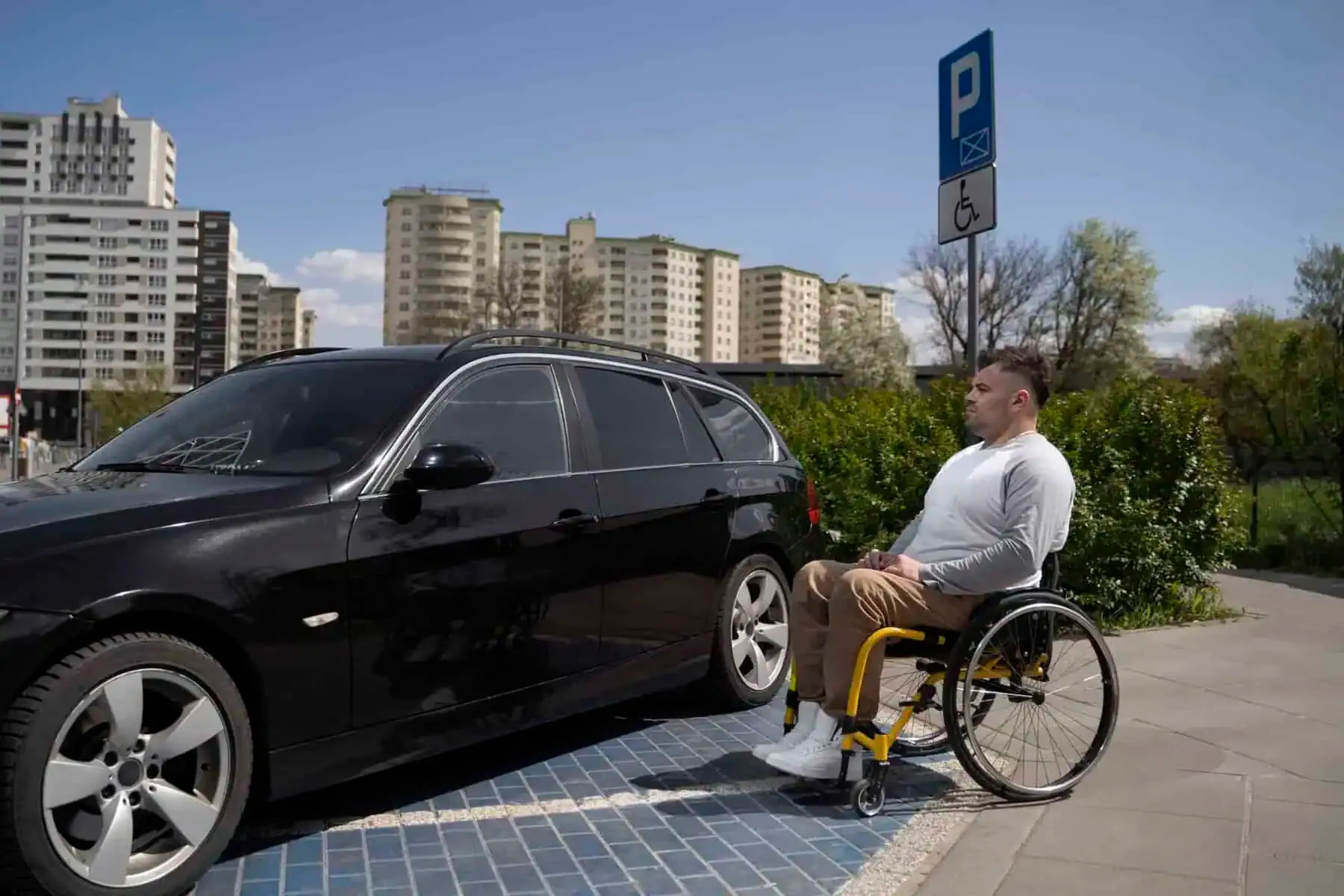
Non-compliance with ADA parking requirements carries significant legal and financial consequences in Los Angeles, particularly under California’s stringent regulations.
- Fines and Lawsuits: Businesses failing to provide required accessible parking spaces face fines starting at $4,000 per violation in California. Individuals encountering access barriers can also file lawsuits, leading to substantial legal costs and potential damages.
- Loss of Reputation : Accessibility issues can deter customers, harm your business’s reputation, and reduce customer trust, impacting long-term success, particularly for Los Angeles business owners.
Compliance is not only a legal necessity but also a critical factor in maintaining customer satisfaction and a positive business image.
Why ADA Striping? Your Success, Our Guarantee
Partnering with a trusted expert like ADA Striping ensures your parking lot meets all ADA and CBC requirements. With over 40 years of experience in Los Angeles, ADA Striping offers services that ensure compliance with California building codes and ADA regulations.
- Expert CASp Inspections: Our Certified Access Specialists provide thorough inspections to ensure full compliance with federal and California-specific regulations, offering peace of mind and legal protection.
- High-Quality Materials : High-Quality Materials are crucial for creating long-lasting handicap parking solutions that meet ADA standards.We use durable, weather-resistant materials for striping, paving, and signage, ensuring long-lasting, functional parking lots that comply with California ADA standards.
- Customized Solutions: Tailored compliance solutions for retail properties, hospitals, or multi-tenant facilities, addressing your specific needs and challenges.
With ADA Striping, your parking lot will remain compliant, accessible, and safe for all customers, including people with disabilities, reducing risks and enhancing customer experience.
Conclusion: Ensure Your Parking Lot Meets ADA Standards
Maintaining an ADA-compliant parking lot is essential for legal compliance, customer satisfaction, and creating an inclusive environment for all, including individuals with disabilities. By adhering to the guidelines in this guide, conducting regular maintenance, and partnering with experts like ADA Striping, you can avoid fines, lawsuits, and reputational damage while fostering a welcoming business environment.
For a free Certified Access Specialist (CASp) inspection or high-quality striping and signage services, contact ADA Striping at (714) 500-7901 to ensure your parking lot meets all ADA and CBC standards.




